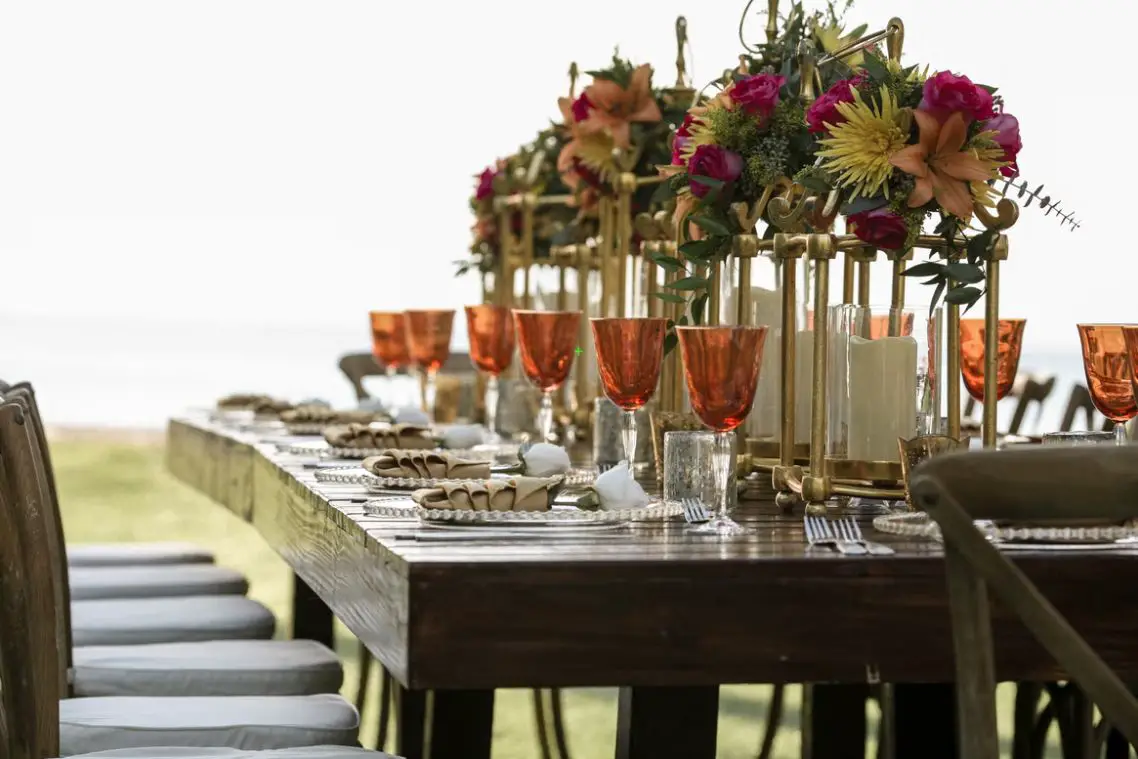Hosting a wedding at home offers a unique blend of intimacy, cost savings, and creative control. Couples can personalise every detail and even include beloved pets in the celebration.
With no venue fees, the freedom to choose vendors, and flexibility in setup, a home wedding can make the day feel personal and relaxed.
However, it’s essential to weigh challenges like space constraints, noise ordinances, property protection, and the demands of logistics and cleanup. For those willing to navigate these hurdles, a home wedding offers the potential for a meaningful and memorable day.
Let’s get straight to the point
A home wedding combines intimacy, cost savings, and the chance to personalise every detail while avoiding traditional venue restrictions. Couples gain freedom with vendors, decor, and pet involvement, creating a warm, memorable experience.
Yet, it requires managing noise ordinances, space limits, logistical demands, and potential property damage. Navigating permits, neighbour relations, and cleanup is essential.
Still, with thoughtful planning, a home wedding offers a unique, meaningful celebration blending the comforts of home with the joy of a wedding day.
Pros Of Hosting A Wedding At A House

1. Cost Savings
One of the primary motivators for choosing a home wedding is the potential for significant cost savings.
- No Venue Rental Fees: Traditional venues often come with steep rental fees, which can be avoided entirely with a home wedding.
- Reduced Transportation Costs: Since decor, attire, or other items do not need to be transported to an external location, transportation costs can be significantly lower.
- Flexible Vendor Timelines: Unlike formal venues, which often require strict timelines for vendor setup and teardown, a home wedding allows vendors more flexibility with delivery and pickup, which can also reduce overall costs.
- Fewer Hidden Fees: Many venues charge for additional items like chair covers, setup, and teardown, which can add up quickly. At home, these extra fees are minimised.
2. Personal And Intimate Atmosphere
A home wedding offers a warm, personal atmosphere that can make your day feel more relaxed, comfortable, and meaningful.
- Sentimental Value: If the house is a family home or has a personal history, hosting your wedding there adds emotional significance to the event.
- Comfortable Environment: A familiar setting can make you and your guests feel more at ease, resulting in a more relaxed and enjoyable experience.
- Custom Decor Options: You have complete creative freedom to design the space to reflect your personality, which is often limited in traditional venues.
- Casual Dress Code Flexibility: Home weddings may lend themselves to a more relaxed dress code, making guests feel more comfortable and allowing you to enjoy the day without the formality of traditional venues.
3. Freedom To Choose Your Own Vendors
Many wedding venues partner with specific vendors, limiting your options. However, you can choose the vendors you like at home and have more control over the event’s details.
- No Preferred Vendor Restrictions: Unlike many venues with exclusive lists, you can hire caterers, florists, and musicians who align with your tastes and budget.
- Customised Setup and Schedule: You can coordinate setup and teardown times without being restricted by a venue’s schedule, making planning easier.
- Reduced Restrictions on Decor and Food: Some venues limit decor options and restrict food and drinks. Hosting at home allows you the freedom to personalise every aspect.
4. Pet-Friendly Option
For animal lovers, a home wedding can include pets, which might only be allowed in some venues.
- Pet Involvement: Pets can participate in the ceremony, take photos, or even entertain guests, adding a personal touch.
- Guest Flexibility with Pets: Some guests may also appreciate being able to bring their pets, creating a more inclusive environment.
- Reduced Pet Care Costs: If you don’t need to board pets or arrange pet sitters for the day, you save additional costs while ensuring your pets are nearby.
5. Environmental Benefits

Hosting a wedding at home can also be more environmentally friendly, especially when it reduces travel and unnecessary expenses.
- Lower Carbon Footprint: WA home wedding can reduce transportation emissions by reducing the number of guests who need to drive to multiple locations, such as a hotel, venue, or restaurant,
- Sustainable Decor Choices: Home weddings allow you to use reusable items from your decor, like dishes, candles, or other home decor pieces, rather than purchasing single-use items.
- Minimised Waste: A home wedding can help reduce overall waste by avoiding packaged decor items or pre-set services at venues.
Cons Of Hosting A Wedding At A House
1. Noise Restrictions And Permits
Residential areas often have noise regulations and permit requirements for large gatherings. This could impact your celebration’s timeline and logistics.
- Noise Ordinances: Many residential neighbourhoods enforce quiet hours as early as 9 or 10 p.m., which could limit the duration of the party.
- Permits and Zoning Restrictions: Hosting a large event may require permits, which can add time, effort, and expense to your planning process.
- Parking Limitations: Neighbourhoods may have limited parking availability, requiring guests to park offsite, use shuttles, or hire a valet service.
2. Space And Facility Limitations
A home may lack sufficient space and amenities for large gatherings, so evaluating your space is crucial.
- Limited Seating Capacity: Depending on the guest list, you may need to limit your invitations or rent additional seating, which could impact the overall experience.
- Bathroom Shortage: Most homes don’t have enough bathrooms for large groups. Renting portable toilets can help, but it may add to costs and require space in the yard.
- Weather Contingency Needs: Weather can become a major concern without a suitable indoor space, potentially requiring a tent rental or even last-minute venue changes if the forecast shifts.
- Limited Dance and Dining Space: A home may need more room for a dance floor or designated dining areas, which could restrict activities and seating arrangements.
3. Property Damage And Cleanup
Hosting a wedding at home can increase the risk of property damage and require a time-intensive cleanup process after the event.
- Risk of Damage: Heavy foot traffic, catering setup, and decor installations can wear down floors, furniture, and landscaping.
- Insurance Considerations: Check to see if your homeowner’s insurance covers third-party liability and consider purchasing additional coverage to protect against accidents.
- Cleanup Requirements: Unlike a traditional venue where staff manages cleanup, hosting at home means you’ll either have to clean up yourself or hire a team, which can be time-consuming and costly.
4. Limited Kitchen And Catering Facilities
Many home kitchens need to be designed to handle the catering demands of a large wedding, which can complicate food and drink logistics.
- Inadequate Kitchen Space: Home kitchens may need more equipment or space to cater to a large group, potentially requiring a mobile kitchen rental.
- Need for Extra Equipment: Caterers may need additional items such as portable stoves, coolers, and food prep areas, which can increase costs and logistical challenges.
- Storage and Service Limitations: Limited kitchen space may restrict food preparation and storage, making it challenging to serve a large group efficiently.
5. Logistical Challenges
A wedding at home requires careful planning to manage logistics such as setup, deliveries, and waste disposal.
- Staggered Deliveries and Setup: Delivering large rental items, such as tents, tables, and chairs, may need to be scheduled in stages, which can complicate timing and add to your stress.
- Waste Management: A wedding produces significant waste, and homes typically lack adequate trash disposal for large gatherings. You may need to arrange for additional bins or a trash collection service.
- Unfamiliar Vendors on Site: Hosting a large event at home means vendors and staff moving in and out throughout the day, which could feel intrusive and affect your privacy.
6. Neighbour Considerations
A large gathering at a residential home can affect the surrounding community, so it’s essential to communicate and coordinate with neighbours.
- Disruption to Neighbours: Hosting a wedding at home means increased noise, traffic, and potentially disrupted parking. Some neighbours might find this inconvenient.
- Advance Notification: Giving neighbours plenty of notice about the event can help, and they may be more willing to assist with extra parking if they know in advance.
- Permit and Compliance Issues: Please notify or work with local authorities to avoid complications if neighbours file noise or parking complaints during the event.
Conclusion
Hosting a wedding at home offers a unique, intimate experience. It allows for personal touches, cost savings, and full creative control, making the day memorable and relaxed.
However, it requires careful consideration of challenges like space limitations, noise restrictions, logistics, and potential property damage.
With thoughtful planning and good communication with neighbours and vendors, a home wedding can beautifully combine personalisation and practicality.
It can create a meaningful celebration that reflects your style while remaining aware of the demands and potential drawbacks of using a residential space.
FAQs About Home Weddings
When planning an outdoor ceremony, how much room do I need?
In general, when seating people in rows, you should allot between 6 and 10 square feet of space per person. Talk to the experts to find out what it takes to pull off a large event on your property. They will help you see what is possible.
How should the bride dress for a ceremony in the backyard?
Dresses made of cotton and linen, as well as short dresses, casual slip gowns, bridal suits, jumpsuits, and other dresses, are common options for a wedding in the backyard.
To what extent may a wedding held outside still be considered formal?
Is it true that weddings held outside are always more relaxed than those held inside?
Certainly not! There are still outdoor weddings that require black or white tie attire, so don’t let the weather stop you from preparing accordingly. The most crucial detail to remember is the dress code.
In a backyard ceremony, what should the mother of the bride wear?
The mother of the bride can feel comfortable in a beaded cocktail dress, a patterned, form-fitting dress, or a dress with mid-length or long sleeves for a garden ceremony.
Could you dance at a home micro wedding?
At the reception of some, speeches are made and the dance floor is opened. While some host a dinner party with no dancing at all. Your tiny home wedding should incorporate the rituals that mean the most to you. The exact right amount, and no more.

